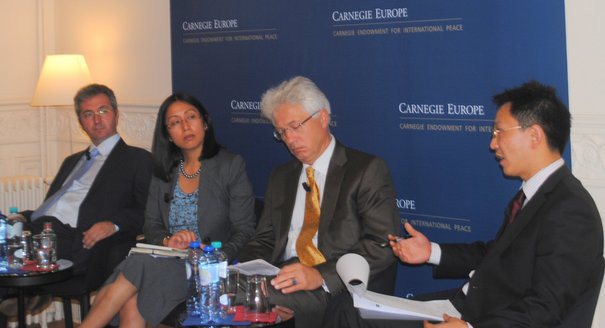Registration
You will receive an email confirming your registration.
IMGXYZ3928IMGZYXBrussels’ limited foreign policy capabilities and competition among member states have hampered the European Union’s relations with China and India. However, with the right mix of realism and self-confidence, the EU may be able to pursue a more interests-based and assertive engagement with both countries.
To mark the launch of his recent commentary “EU Relations with China and India: Courting the Dragon, Wooing the Elephant,” Carnegie’s Bernd von Muenchow-Pohl compared EU relationships with China and India. He was joined by Lawrence Sáez, professor and chair at the Centre of South Asian Studies of the School of Oriental and African Studies, University of London, and Xie Tao, associate professor at the American Studies Center of the Beijing Foreign Studies University. Carnegie’s Lizza Bomassi moderated.
Event Highlights
- Managing EU Expectations of Itself: Von Muenchow-Pohl attributed EU disappointment about the development of its relations with China and India—or lack thereof—to the mismanagement of EU self-expectations. Although the EU had created blueprints for strategic partnerships with both China and India, he explained that the limited power of European institutions and competition and disunity among member states have prevented many of the goals from being achieved.
- Managing EU Expectations of Strategic Partners: As frustrations mount over stalled relations, von Muenchow-Pohl recommended a strategic revision of EU expectations for its partnerships with China and India. He urged Europeans to reorient their expectations by focusing on economic levers in each country: trade, investment, and technology.
- “Courting the Dragon”: Xie criticized the EU-China relationship as more of a one-way courtship by China for both political and economic reasons. He explained that politically, China uses its engagement with the EU as a “soft balancer” against U.S. initiatives in Asia, and economically, China is eager to depend less on the American market by diversifying its foreign exchange reserves with investment in Europe.
- “Wooing the Elephant”: Stalled negotiations with India over a free trade agreement have helped sustain market entry problems and market distortions for European companies, von Muenchow-Pohl said. Sáez warned that the potential for a free trade agreement is hindered, however, by the EU’s own reluctance to import agricultural products from China, India, and other developing countries. Politically, the EU is actively seeking to establish shared foreign policy interests and visions with India, encouraged by the similarities between EU and Indian governing and societal structures, Sáez added.
